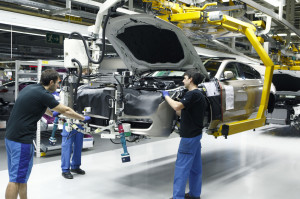 Most automotive markets throughout the world are recovering and overcoming their long-standing weakness, German Association of the Automotive Industry (VDA) reports. This market grew for the fifth time in succession by just under 5 per cent to 897,100 sold units. China and Japan also registered increases. Only the light vehicle market in the USA saw negative development while demand for new cars in Russia and India also dropped. On the whole, however, the reports from the automobile market are also positive for German machine tool manufacturers since more than 40 per cent (position at 2012) of their products are purchased by motor vehicle manufacturers and their component suppliers. However, the tool industry has no reason to relax: the automotive industry is in a state of flux. More and brands are coming onto the world market, every niche is being filled and new drive concepts are creating uncertainty over the form of the future automobile.
Most automotive markets throughout the world are recovering and overcoming their long-standing weakness, German Association of the Automotive Industry (VDA) reports. This market grew for the fifth time in succession by just under 5 per cent to 897,100 sold units. China and Japan also registered increases. Only the light vehicle market in the USA saw negative development while demand for new cars in Russia and India also dropped. On the whole, however, the reports from the automobile market are also positive for German machine tool manufacturers since more than 40 per cent (position at 2012) of their products are purchased by motor vehicle manufacturers and their component suppliers. However, the tool industry has no reason to relax: the automotive industry is in a state of flux. More and brands are coming onto the world market, every niche is being filled and new drive concepts are creating uncertainty over the form of the future automobile.
The market needs flexibility, ma also ease of operation. The balance between economical large-series production and niche diversity is confirmed by Prof. Dr.-Ing. Eberhard Abele, Head of the Institute for Production Management, Technology and Machine Tools (PTW) at Darmstadt University of Applied Sciences: “Unfortunately it is always still the case that flexibility is normally accompanied by productivity losses or additional costs; we will therefore always have to find a compromise in practice.” According to Abele and his PTW colleagues, who will again present “future trends” in their “PTW Innovation Tour” at AMB, one viable way is offered by modular machine structures, “especially also production systems based on modular systems.” These systems offer far more production flexibility than was possible years ago. New developments in control technology and the Industry 4.0 concept can also further increase flexibility in the next few years.
“Suppliers should develop the most flexible production facilities which are based on
2 5 the one piece production concept,” advised Markus Jurditsch, Managing Director of SWJ Engineering GmbH in Griesheim.
The engineering and consulting company assists firms in the automotive industry right up to the construction of complete factories at home and abroad. Jurditsch is seeing increasing modularisation and the use of ever larger and more complex modules. This ties in with the wishes of production practicians from the automotive industry. They want mechanical engineering companies to provide non-component-dependent modular systems with the highest possible flexibility in order to be able to better adapt investments to the production volume from time aspects and react quickly to fluctuations in demand. It should also be possible to easily reuse these modules at a later date.
For automotive industry flexibility is not only required in terms of variant diversity, but also in electromobility. This topic still does not play a role in production on account of the comparatively insignificantly small unit numbers. Nevertheless, the first suppliers have thought about this. For example, Grob-Werke GmbH & Co. KG developed a milling machine/lathe which is especially suitable for machining components for electric motors. The Mindelheim-based specialist for general customer-specific solutions is also assuming that there will be greater demand for assembly technology in future; we have adjusted to this accordingly.



